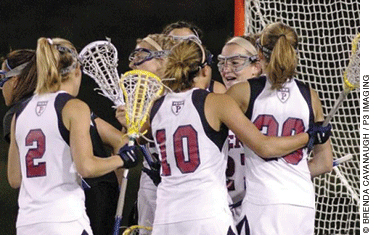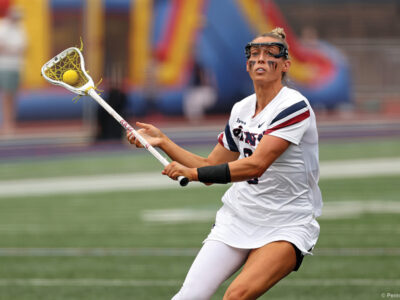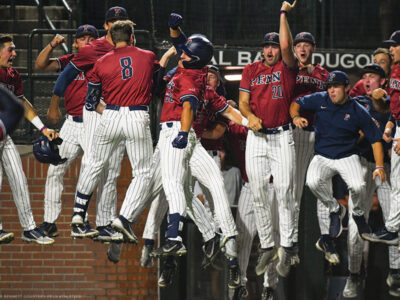By David Porter

It would be nice to be able to fit the Penn women’s lacrosse team’s sparkling achievements into a tidy box: The downtrodden Quaker program revives under coach Karin Brower and qualifies for the NCAA tournament in 2007 after a 23-year absence; a magical run to the Final Four culminates in a humbling 12-2 semifinal loss to eventual champion Northwestern, leading to calls of ‘taking the next step’ in 2008; that goal is realized as the Quakers advance all the way to the NCAA title game where they lose to Northwestern, albeit by a more respectable score.
Such an analysis eliminates the human element, of course, which is why, ultimately, it falls short. Being within sight of a cherished goal and falling short is difficult enough; being so close that it takes on tangible, definable features before slipping away can be excruciating.
That was the place Brower found herself a few weeks after Penn’s 10-6 loss to the Wildcats on May 25 in the first-ever championship appearance by a Quaker team in an NCAA-sponsored event. The architect of the program’s rapid and remarkable ascendance into the sport’s upper echelon was still in replay mode, lamenting lost opportunities.
“Losing like that, when you come so close and could have been the national champs, is the hardest thing. You relive those opportunities, the little things, the split-second decisions that you make,” Brower said. “Last year was easier—you were able to reflect on it and put it past you a little quicker. It’s more disappointing this time. No one likes to finish second.”
Running through the Quakers’ long list of accomplishments these last two seasons could become laborious, though the school-record 15 straight wins in 2008 and the 33-4 record over two years (surpassed only by Northwestern nationally) are two that deserve mention.
Suffice it to say that the lasting achievement may have come on April 27, when Penn upset Northwestern 11-7 at Franklin Field in its next-to-last regular season game. It was a shot across the bow at the three-time defending national champions and it reverberated across the country for weeks—evidenced by the fact that it was all anyone wanted to ask Brower about on the pre-Final Four media conference call with the four coaches.
Penn won that game by successfully handling Northwestern’s pressure defense, a unit that is superb at creating havoc by anticipating where the next pass is going to go. Unfortunately for the Quakers, they couldn’t duplicate the effort in the rematch a month later at Towson University in the NCAA title game, particularly in the first half.
Coming off a draining overtime win over Duke in the semifinals on May 23, Penn’s Ali DeLuca opened the scoring barely a minute into the game before Northwestern tallied four straight goals in a span of 13:55. With the specter of 2007’s drubbing looming over them, the Quakers fought back, and Kaitlyn Lombardo’s free position goal brought them to within two.
Then came one of the game-changing sequences that may still keep Brower up at night. Late in the half, Penn’s Giulia Giordano found open space in front of the Northwestern net but her shot was stopped by goalkeeper Morgan Lathrop. The Wildcats took possession and eventually scored with 11 seconds left in the half for a 5-2 lead. Such rapid swings are not uncommon in lacrosse, but the timing of this one dealt a blow to Penn.
The Wildcats stayed tantalizingly out of reach for the rest of the game. Trailing 8-3, the Quakers scored three unanswered goals, by Chelsea Kocis, Rachel Manson and DeLuca, but Northwestern broke the string with a goal by Hannah Nielsen with 11:35 left to play. Allison Ambrozy hit the post twice on an ensuing sequence for Penn, and Nielsen added a late insurance goal.
“We made a couple of mistakes and they scored; they made some mistakes and we didn’t score,” Brower said. “But the kids really fought. I don’t think anybody really thought we were out of it until the very end.”
Ambrozy was one of seven seniors who during their four years helped transform the Quakers from a moderately successful program to one that gradually began to believe in itself and then attracted the talent to first unseat the Ivy League’s traditional powers and then challenge the nation’s best. She echoed some of Brower’s feelings in the wake of the title game loss.
“It hurt a lot,” Ambrozy said. “It was so difficult to walk out of that game. [The 2007 game] really lit a fire under us and we had put in so much hard work and so much effort. But I’m still so proud of the way the team played, and it’s hard to be too upset about it.”
In addition to Ambrozy, Brower will lose the services of All-Region players Tarah Kirnan, Melissa Lehman, Rachel Manson and goalie Sarah Waxman, the Ivy player of the year, for next season. She admits to being proud of the fact that she has been able to elevate the program to such a high level without the blue-chip recruiting classes that the some of the more-established programs enjoy. Instead, Brower said, she searches for the athlete who may not be the most polished lacrosse player or who may not have been wooed by the elite programs, but who has “a chip on her shoulder when she gets out on the field.”
She also knows that even the most well-stocked teams need more than talent to reach the heights the Quakers reached in 2008.
“You never know when you’re going to get back,” she said. “You need to have the senior leadership, and you also have to have some luck along the way. We graduate seven, but the legacy of what it takes to win is here. We just have to understand that sometimes you’re going to lose, and it’s how you deal with that.
“There’s a lot of expectation, and I’m fine with that; it makes the kids work harder. And they have some big shoes to fill.”
David Porter C’82 writes for the Associated Press.




